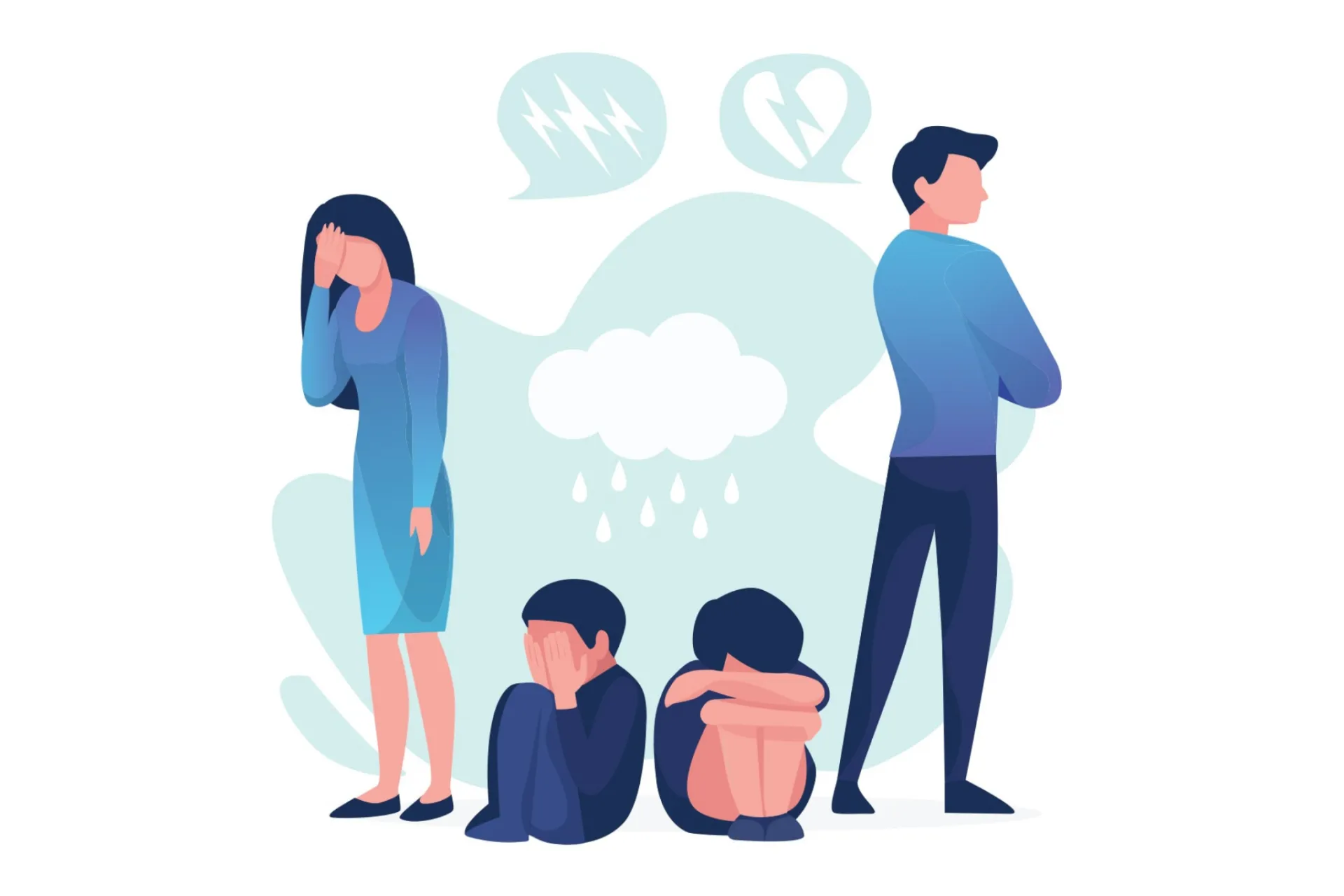Counselling for Divorce or Breakup Depression
Breakups and divorces can be some of the most emotionally challenging experiences in life. They often leave individuals feeling lost, hurt, and overwhelmed by emotions that can significantly impact mental health. Breakup depression is a typical response to the end of a relationship, as individuals struggle to adjust to a new reality without their partner.
Seeking counselling during this period can provide crucial support. It can help individuals process their feelings, develop coping strategies, and rebuild their self-worth. Professional guidance can make it easier to navigate the emotional complexities of a breakup and work towards a healthier, more fulfilling future.
How to Deal with a Breakup: Why Are They So Painful?

The pain of a breakup or divorce goes beyond just losing a partner. It involves the loss of shared dreams, companionship, and often a significant part of one’s identity. Emotional attachment plays a vital role in why breakups feel so painful.
When people form deep connections, their brains release chemicals like oxytocin and dopamine, creating a strong emotional bond. When this bond is suddenly severed, individuals may experience withdrawal-like symptoms similar to addiction.
Another reason breakups are so painful is the fear of uncertainty. The future that once seemed predictable and secure is now unknown, leading to anxiety about what lies ahead. Additionally, many people develop a strong sense of identity within their relationship. Losing a partner can mean losing part of oneself, making it difficult to adjust to life as an individual again.

Loneliness and isolation can also make breakups incredibly painful. A partner often becomes a primary source of emotional support, and their absence can lead to a sense of emptiness. If past emotional trauma exists, a breakup can also amplify these unresolved wounds, making the recovery process even harder. Recognizing these reasons can help individuals validate their emotions and understand why healing takes time.
Symptoms of Breakup Depression

Breakup-related depression can manifest in several ways, including persistent sadness and crying spells. Many people lose interest in activities they once enjoyed and feel a constant sense of hopelessness or worthlessness. The emotional turmoil may also make it difficult to concentrate or make decisions, leading to decreased daily productivity.
Physical symptoms of breakup depression can include changes in appetite, with some individuals overeating as a form of comfort while others lose their appetite altogether. Sleep disturbances are also common, with some struggling with insomnia while others sleep excessively as a way to escape their pain. Fatigue and low energy levels are frequent, making staying engaged in daily life difficult.
Breakup depression can also lead to social withdrawal. Many individuals isolate themselves from friends and family, feeling too emotionally drained to engage in social interactions. In severe cases, increased anxiety, irritability, and even thoughts of self-harm may arise. If these thoughts occur, seeking immediate professional help is essential.
Causes of Depression After Breakup

There are several reasons why people experience depression after a breakup. One major factor is emotional dependency. If an individual relies heavily on their partner for emotional support, they may struggle to function independently once the relationship ends. This can lead to an overwhelming sense of loneliness and uncertainty about how to cope alone.
Unresolved trauma can also contribute to post-breakup depression. If someone has past experiences of abandonment, betrayal, or neglect, a breakup can reopen these wounds and intensify negative emotions. The sudden change in daily routine and the uncertainty about the future can create immense stress, making it difficult to adjust to life without a partner.

Many individuals also experience guilt and self-blame after a breakup, questioning what they could have done differently. This self-critical thinking can lead to decreased self-esteem and prolonged emotional distress. The social stigma surrounding divorce or separation may also cause additional stress, mainly if individuals feel judged by family, friends, or society. Understanding these causes can help individuals recognise their emotional responses and take steps toward healing.
Coping with Family Break-Up, Separation, or Divorce

The emotional burden can be even heavier when a breakup involves family, such as children or shared assets. Open communication is crucial, especially when children are involved. Reassurance and explaining the situation age-appropriately can help ease their anxiety.
Setting healthy boundaries with an ex-partner is also essential to prevent emotional manipulation or ongoing conflict. If legal or financial matters need to be settled, seeking professional advice can reduce stress and clarify responsibilities. Building a support network is another key aspect of coping with separation. Surrounding yourself with friends, family, or support groups can offer emotional encouragement and lessen feelings of isolation.
Lastly, focusing on self-growth can be a powerful way to move forward. Rediscovering personal interests, setting new goals, and creating a fulfilling life outside of the relationship can help individuals regain confidence and a sense of independence.
Self-Care Tips for Looking After Yourself During a Breakup or Divorce

Taking care of yourself after a breakup is essential for emotional healing. Physical activity can have significant mental health benefits, as exercise releases endorphins that help combat stress and improve mood. Mindfulness practices such as meditation, deep breathing, and journaling can also assist in processing emotions and gaining clarity.
Limiting contact with an ex-partner, especially in the initial stages, can prevent emotional setbacks and allow space for healing. Instead of focusing on memories, individuals can channel their energy into hobbies and activities that bring joy. Whether painting, hiking, or reading, finding something enjoyable can provide a sense of purpose.
Maintaining a healthy routine is also crucial. Prioritizing sleep, eating nutritious foods, and staying hydrated can positively impact mental well-being. Most importantly, allowing yourself to grieve is a necessary part of the healing process. Accepting sadness as a natural response to loss will help us move forward.
Grieving the End of a Relationship

Breakups and divorces often involve a grieving process similar to mourning the loss of a loved one. The first stage, denial, is when individuals struggle to accept that the relationship has ended. This may be followed by anger, where resentment towards the ex-partner or the breakup circumstances emerge.
Bargaining is another stage where individuals may wish to undo the breakup or fantasize about reconciliation. When it becomes clear that the relationship cannot be salvaged, depression often sets in, bringing deep sadness and feelings of emptiness. Finally, acceptance marks the stage where individuals begin to make peace with the situation and focus on rebuilding their lives.
Each person moves through these stages at their own pace. Allowing oneself to experience these emotions without suppressing them is crucial for healing and emotional recovery.
How Counselling Can Help with Depression After Divorce or Breakup

Counselling provides a supportive space where individuals can process their emotions, identify unhealthy thought patterns, and develop effective coping strategies. A therapist can help validate feelings of sadness, anger, or confusion, making the healing process feel less isolating.
Counselling can help individuals learn emotional regulation techniques such as mindfulness and cognitive-behavioural strategies. Therapy can also help address underlying emotional wounds that may be contributing to prolonged sadness or self-doubt. With professional guidance, individuals can work toward achieving emotional closure, gaining clarity, and developing the confidence to move forward in life.
Finding Experienced and Trusted Support
If you are struggling with depression after a breakup or divorce, seeking professional counselling can be a transformative step in your healing journey. Gold Coast Counsellor Lee Calleja from Chirn Park Health Group offers compassionate and tailored counselling services through in-chair sessions at the Southport Clinic or online video consultations.
With professional guidance, you can navigate your emotions, gain clarity, and develop healthy strategies for moving forward.
Contact our Gold Coast Counselling Services today to start your journey toward emotional healing and renewed self-confidence.









